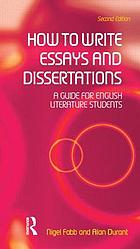 The Literary Theory Handbook
by
Gregory Castle
The Literary Theory Handbook
by
Gregory Castle
Call Number: Ebook
Introduces students to the history and scope of literary theory, showing them how to perform literary analysis, and providing a greater understanding of the historical contexts for different theories. Far reaching in its inclusion of a detailed history of theory and in-depth discussions of major theories and movements. Four distinct perspectives on theory--historical, thematic, biographical, practical--are carefully intertwined, so that key concepts, terms and ideas are developed in different contexts and cross-referenced, in the text and in the index.
 How to Write Essays and Dissertations: a guide for English literature students
by
Alan Durant; Nigel Fabb
How to Write Essays and Dissertations: a guide for English literature students
by
Alan Durant; Nigel Fabb
